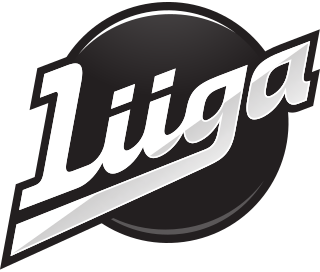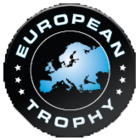
The Swedish Hockey League is a professional ice hockey league, and the highest division in the Swedish ice hockey system. The league currently consists of 14 teams. The league was founded in 1975, and while Swedish ice hockey champions have been crowned through various formats since 1922, the title and the Le Mat Trophy have been awarded to the winner of the SHL playoffs since the league's inaugural 1975–76 season.

The SM-liiga, colloquially called the Finnish Elite League in English or FM-ligan in Swedish, is the top professional ice hockey league in Finland. It was created in 1975 to replace the SM-sarja, which was fundamentally an amateur league. The SM-liiga is not directly overseen by the Finnish Ice Hockey Association, but the league and association have an agreement of cooperation. SM is a common abbreviation for Suomen mestaruus, "Finnish championship".
J20 Nationell is a junior ice hockey league composed of 20 teams in Sweden. Previously known as the J20 SuperElit, it is the highest-level junior ice hockey league in Sweden. The teams are divided in two groups, or divisions, Norra (North) and Södra (South), and are usually associated with a professional team in either the Swedish Hockey League (SHL) or HockeyAllsvenskan in order to develop talented youth for the professional teams. The winning team of the J20 Nationell playoffs is awarded the Anton Cup.
The 2008–09 Champions Hockey League was the only season of the Champions Hockey League (2008–09), an IIHF-organized ice hockey tournament for the best club teams in Europe. The season was played with 12 teams from seven countries . Every participating team was guaranteed an appearance fee of 300,000 euro and the winner received 1,000,000 euro. Prize money was also awarded for winning group stage matches, for the semi-final appearance and for the other finalist . In total, 10 million euros were distributed, the largest prize sum ever in a European hockey club competition. The ZSC Lions from Switzerland won the competition by beating Russia's Metallurg Magnitogorsk in the finals.

The 2011 IIHF World Championship was the 75th IIHF World Championship, an annual international men's ice hockey tournament. It took place between 29 April and 15 May 2011 in Slovakia. The games were played in the Orange Arena in Bratislava, and the Steel Aréna in Košice. The Czech team was the defending champion.

The Chance Liga is the second-highest level of professional ice hockey in the Czech Republic, after the Extraliga. It began in 1993 and is run and administered by Czech Ice Hockey Association.
The 2009–10 Czech Extraliga season was the 17th season of the Czech Extraliga since its creation after the breakup of Czechoslovakia and the Czechoslovak First Ice Hockey League in 1993. In the regular season, Plzeň 1929 finished atop the league, Roman Červenka led the league in points and assists, and Petr Ton led the league in goals.
The 2010 European Trophy was a European ice hockey tournament, played between 11 August and 5 September 2010. It was the first edition of the European Trophy. The final weekend was played in Salzburg and Zell am See, with the final held at the Eisarena Salzburg, which Eisbären Berlin won 5–3 over HV71 Jönköping.

The Czech Extraliga is the highest-level ice hockey league in the Czech Republic. It was created in 1993 following the peaceful dissolution of Czechoslovakia midway through the 1992–93 Czechoslovak Extraliga season.
The 2011 European Trophy was the second European Trophy, a European ice hockey tournament held annually. It was also the sixth tournament since its predecessor, the Nordic Trophy, was launched in 2006. The regulation round began on 11 August 2011 and ended on 6 September 2011. The playoffs, which took place in Austria, were played 16–18 December 2011 in the Eisarena Salzburg in Salzburg, and the Albert Schultz Eishalle in Vienna, at the same time as the 2011 Channel One Cup. The playoff hosts, Red Bull Salzburg, won the playoffs and captured their first championship title in the European Trophy tournament, having lost in the quarterfinals last year.

The 2014 World Junior Ice Hockey Championships was the 38th edition of the Ice Hockey World Junior Championship (WJHC), hosted in Malmö, Sweden. The 13,700-seat Malmö Arena was the main venue, with the smaller Malmö Isstadion the secondary venue. It began on December 26, 2013, and ended with the gold medal game on January 5, 2014.
The 2012 European Trophy was the third European Trophy, a European ice hockey tournament held annually. It is also the seventh tournament since its predecessor, the Nordic Trophy, was launched in 2006. The regulation round started on 31 July 2012 with the South Division game between Piráti Chomutov–Slovan Bratislava, and will end on 28 November 2012. The playoffs will be played between 13 and 16 December 2012 in Vienna and in Bratislava. The preliminary schedule for the regulation round was released on 12 April 2012.
The 2012-13 IIHF European Women's Champions Cup was the ninth playing of the IIHF European Women's Champions Cup. HC Tornado of Russia's Women's Hockey League won the tournament for the third time in four seasons and second consecutive time.
The 2013 European Trophy was the fourth and final season of the European Trophy, an annually held European ice hockey tournament. It was also the eighth tournament since its predecessor, the Nordic Trophy, was launched in 2006. The regulation round began on 6 August 2013 with the South Division game between Piráti Chomutov–Sparta Praha, and ended on 8 September 2013. The playoffs were played between 19 and 22 December 2013 in Berlin. The preliminary schedule for the regulation round was released on 15 April 2013.
The 2013–14 season of Division 1, the third tier of ice hockey in Sweden, organized by the Swedish Ice Hockey Association (SIHA), began on 11 September 2013. The regular season concluded on 16 February 2014. The following playoffs towards the qualifier to the second-tier league HockeyAllsvenskan began on 19 February 2014 and ended on 7 March 2014. The qualifiers to Division 1 began on 2 March 2014 and ended on 26 March 2014. The qualifier to HockeyAllsvenskan began on 13 March 2014 and ended on 5 April 2014. The 2013–14 season was the last season the league was named "Division 1"; in April 2014, the league was renamed "Hockeyettan".

The Champions Hockey League is a European first-level ice hockey tournament. Launched in the 2014–15 season by 26 clubs, 6 leagues and the International Ice Hockey Federation (IIHF), the tournament features top teams across Europe.
The 2014–15 Champions Hockey League was the first season of the Champions Hockey League, a European ice hockey tournament launched by 26 founding clubs, six leagues and the International Ice Hockey Federation (IIHF).
The 2018–19 Champions Hockey League was the fifth season of the Champions Hockey League, a European ice hockey tournament. The tournament was competed by 32 teams, and qualification was on sporting merits only. The six founding leagues were represented by between three and five teams, while seven "challenge leagues" were represented by one team each. One place was awarded to the Continental Cup champion. Unlike in the first three editions, founding teams did not automatically qualify. The group stages began on 30 August 2018, and ended on 17 October 2018. The season had an average attendance of 3,401 per game, one percent increase from the previous season.
The 2021–22 Champions Hockey League was the seventh season of the Champions Hockey League, a European ice hockey tournament. The tournament was competed by 32 teams, with qualification being on sporting merits only. The six founding leagues were represented by between three and five teams, while seven "challenge leagues" were to be represented by one team each.
The 2022–23 Champions Hockey League was the eighth season of the Champions Hockey League, a European ice hockey tournament. The tournament is competed by 32 teams, with qualification being on sporting merits only. The six founding leagues will be represented by between three and five teams, while seven "challenge leagues" will be to be represented by one team each.








